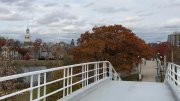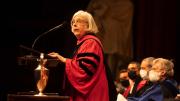Last June, as we were both preparing for our summer internships, my mother and I traded fashion advice. We had each gone shopping for the first day of work (I at a weekly magazine, she in a judge’s chambers), and now we were comparing outfits in the living room. My skirt and blouse were quickly assessed (“Needs ironing”) and hung back in the closet. But my mother walked around the living room shrugging her gray suit on her shoulders. My words of encouragement--“You look professional!”--seemed to have little effect. “Should I really wear this? Are you sure it doesn’t look too square?”
My mother started law school at the same time I started college, and because hers is a four-year night program, our school schedules are synched. We take our exams during the same busy weeks and experience similar relief at the end of December and May. Last spring, we compared notes on cover letters and interviews for our job applications. We will probably graduate within days of each other.
As students, we’ve shared study habits (take notes by hand), general truths (You can’t avoid having a few bad professors), and encouraging platitudes (It’s okay! No one will care how you did on your “Science of Cooking”/“Constitutional Law” midterm!). Where she’s listened to my complaints about freshman-year roommates and dining-hall food, I’ve helped her buy textbooks online and wished her luck in moot-court practice. Occasionally, we’ve even studied together. When mom came to visit during Freshman Parents Weekend, I swiped her into Lamont on the pretext that she was touring the library. Instead, we sat side by side in the big, open room on the first floor--she diligently taking notes on a huge red volume that she had lugged from New York City on the train, I casually reading about Greek myths. Eventually I left to meet friends, and she stayed at the wide desk alone, papers spread out.
I asked my friend Erika Pierson, a junior history and literature concentrator in Lowell House, what it’s been like seeing her mother get a master’s in costume design while she’s been at college. “My mom didn’t have a set career when I was growing up,” she told me, “so I had never seen her do something she was really passionate about.” Now her mother drives around San Diego taking measurements and buying fabric, and Erika is thrilled at how enthusiastic her mom is: “It’s been an inspiration because it’s an unconventional career. And it’s been a great support system. She knows college better than most people.” The only inconvenience? “When I left, she took over my desk as a sewing station. I’ll go home for vacations, and my house looks like a scene from Project Runway. The closet in my bedroom is full of princess costumes.”
It’s true that a parent in school can bring certain advising advantages. I know that my mother has felt the frustration of a paper that won’t write and the excitement of mastering a difficult topic. I don’t need to explain my elaborate theory that I am a “bad test-taker”--she’s said the same thing about herself. And talking with her is a good way to get perspective on those occasional hurdles that crop up in college. Although we are both taking a substantial course load, Mom is also working a full-time job in the financial industry.
Sometimes, though, I wonder whether we are a little too enmeshed in each other’s scholastic lives. This usually occurs to me about twice a year, when my mother calls to inform me of her grades. Once, she reached me in the middle of a date (“I got my first A! Aren’t you going to congratulate me?”), and often, when the news has been disappointing, I haven’t known how to respond. Last fall, I was chastised for passing along a speculative tidbit I had heard in the Kirkland dining hall--that, because of grade inflation, GPAs once considered good might be viewed with new scrutiny. “Madeleine has informed me that ‘B is the new F,’” Mom announced at Thanksgiving. The Harvard College Handbook for Students, which is quite verbose on the subject of grades, is conspicuously silent on how to counsel parents about them.
Changing careers later in life is no longer a rarity, so it is not uncommon for students and their parents to be toying with big decisions at the same time. Neither the Office of Career Services (OCS) nor the Harvard Alumni Association has concrete data on how often Harvard graduates change jobs or when they go back to school. Class surveys, though, indicate that the majority of Harvard alumni have shifted directions when it comes to their careers. With the financial collapse of 2008, such shifts have become more widespread. “That mindset of a flexible career is even more prevalent today than among students five or 10 years ago,” says Robin Mount, director of career, research, and international opportunities at OCS. “Students have seen their family members lose jobs or change them. Gone is the time when you start out at a company and work there for the rest of your life.”
Freshman Week, in one of the welcoming speeches, our Yard dean mentioned that many of us might have grown up thinking that “doctor, teacher, lawyer” were our only options. The dean told us how important it was to follow our passions--even if they led us to unexpected places. A spirit of adventure, she suggested, was key to making the most out of college. The talk made its mark on my pre-med roommate. “I actually did think those were the only options,” she told me as we walked out of the Science Center.
But talking about passions is one thing--actually following them is another. By the time I started to think about what professional directions I might want to take, I had heard “The average American changes careers seven times” so often that it was hard not to become numb to its message. The last thing that an enthusiastic Harvard student wants to do is to imagine flitting from job to job until she lands somewhere by chance, especially when the economy is so uncertain. Despite her interest in history, my roommate is still pre-med: in part, she told me, “because I really like the idea of knowing the next step.” I am sure that others have had similar gut reactions when told how common it is to be undecided: “I’m not the average American. I’m Madeleine Schwartz!”
I admire the dedication of someone who follows a dream, even when doing so is challenging. When Mom decided that she wanted to go back to school, she called up the pre-law tutor in her old House, Dunster. One law school required a dean’s letter, which would be difficult to obtain, she explained, because her dean had been dead for several years. The scene struck me particularly acutely because it came around the time that I was looking for my own letters of recommendation for college. Wherever you end up, I remember thinking, make sure you put your letters on file. And this kind of frustration is routine for older students, who have to learn how to study all over again. Mom once described the experience of taking classes with students half her age after 30 years in the workforce: “What’s most challenging is that you come in to class knowing how to make a soufflé--but you’re all there to make omelets.”
Harvard offers many resources for students who want to figure out where their future lies. Advisers, tutors, and OCS keep their doors open to help undergraduates embark on this kind of discovery. It seems that every day I get another invitation to talk about “the next step” with a Harvard affiliate. The people who are actually useful, though, are those who offer thoughtful conversation and don’t just dispense advice. One can’t find one’s passions in a booklet on summer internships or a list of possible career paths. It’s a gradual process that involves sharing thoughts and then coming back to them; a discussion that doesn’t always have its end goal in mind. In the course of my time at Harvard, it has been just such a give-and-take--with professors, with friends, and with my mother--that has slowly shaped my ideas of who I might want to be.
Though sometimes a quick bit of advice is all one really needs. A few weeks ago, I found myself caught in a familiar pattern: a difficult essay and a long day ahead, the kind of situation that always seems to bring up the question, “And what am I going to do with my life anyway?” “What am I supposed to do now?!” I despaired in an impassioned voicemail to my mother. Her response came via text message: “In class. Can’t talk. Don’t worry. Be happy.” From anyone else, the answer might have seemed trite or silly. But I took her at her word, shut down my computer, and walked down to the Kirkland courtyard to see what might be happening there.








